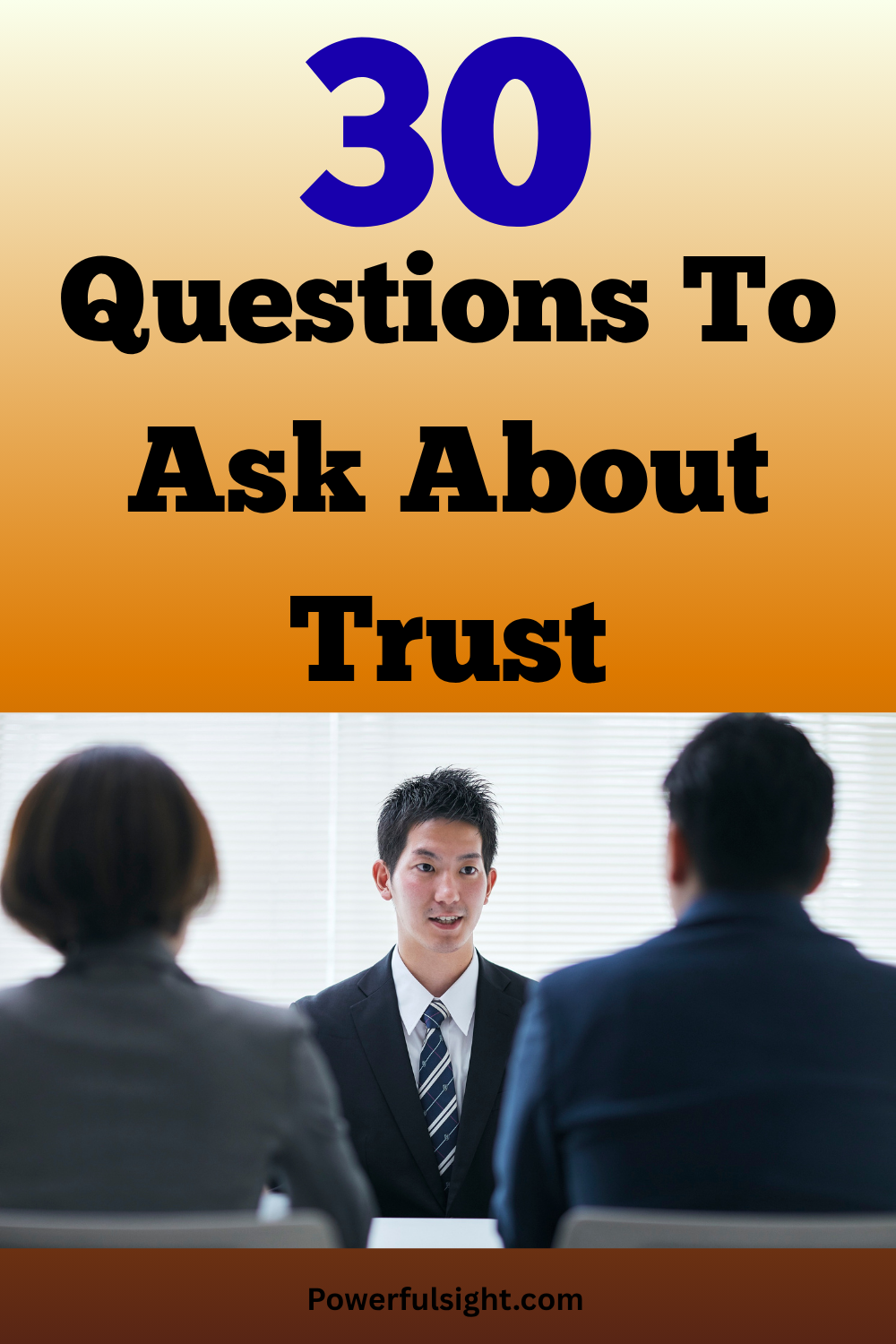Trust is the foundation on which any relationship is built. It colors the way we see the people in our lives, the way we treat them, and the way we are treated by them.
Without trust, it is impossible to know another person and form any bond with them. However, there is often a lack of understanding when it comes to this basic concept of interpersonal communication.
We often neglect trust and take it for granted, forming our opinions based on past hurts, preconceptions, and misconceptions.

Related: How to Overcome Trust Issues
1. What is trust to you, and how is it different from faith?
A lot of people conflate trust and faith as being synonymous. While similar, trust and faith are different. Trust can be built, broken, and rebuilt, while faith tends to be more blind or not tied to personal experience. In order to build proper trust expectations in your life, it’s important to understand the difference.
2. How do you build trust when there’s been a betrayal?
Betrayal of trust can be devastating, often creating a feeling that the relationship is now in a state of constant uphill battle. What steps do you think are necessary in the process of earning back someone’s trust?
3. Is it possible to trust someone completely? Or do we always have to set some limit to our trust?
Unconditional trust sounds nice in theory, but is it healthy or safe in practice? Is it always necessary to expect some level of mistrust, even in the closest relationships?
4. How do you recognize if someone is trustworthy from the start of a relationship?
There are almost always early signs of someone’s level of trustworthiness. While not always easy to spot, especially in the early stages of a relationship, these signs can set the tone for what is to come. What should you look for in someone’s behavior to understand if you can trust them?
5. When does trusting someone become too much?
Trust makes you vulnerable, which can be incredibly intimate and bonding. However, trusting someone too much can set you up for a fall and leave you heartbroken. How do you recognize if you’ve crossed that line?
6. How do your personal boundaries affect the level of trust in your relationships?
Boundaries and trust go hand in hand. Healthy, open boundaries are the only way two people in a relationship can feel safe with each other. How can you set your boundaries in such a way as to promote trust without driving a wedge?
Related: How to Stop Trusting People
7. Can you trust someone, but still not feel safe around them?
Trust does not always equal safety, or vice versa. You can feel safe enough to trust someone with a job or responsibility, but may not feel emotionally or physically safe with that same person. How do you draw the line between trust and safety in your life?
8. How does honesty contribute to trust?
Trust and honesty are directly linked and intertwined. Is it possible for a relationship to survive without complete transparency, or is it okay to withhold certain information?
9. Can trust ever be regained 100% after a major violation?
There are some instances where trust is broken in a more significant way, such as cheating, personal betrayal, or dishonesty. Can the relationship ever go back to how it was, or will it always be “off”?
10. What’s the difference between trust and reliance?
Trust is emotional, while reliance is more of a transactional type of faith. Where is the line between trusting someone emotionally and relying on them for certain functions?
Related: Importance of Trust and Honesty in a Relationship
11. How are trust and vulnerability connected in a healthy relationship?
Vulnerability is only possible with trust. In being vulnerable, you are allowing someone to know the real you, the good and the bad. When you open yourself up, you either build or break trust. How does the exercise of vulnerability help you build stronger trust?
12. How do people abuse trust?
The dark side of trust is how people can exploit it to their advantage. How can you protect yourself from people who will take your trust and use it against you?
13. Can you regain trust without forgiveness?
Forgiveness is necessary for trust to be rebuilt, but can trust be regained without forgiveness? What is the role of forgiveness in the trust-building process?
14. How do expectations shape the trust dynamic in a relationship?
Expectations often set the stage for trust in relationships. But where do you draw the line with your expectations? Are unmet expectations the enemy of trust?
15. What does it mean if trust is broken, but the relationship persists?
Breaks in trust are one of the reasons why some relationships end. But if a relationship continues after a trust violation, does that mean it was never actually “broken,” or is the relationship based on something deeper?
Related: 9 Things That Make a Man Trust a Woman
16. Can you trust someone in one part of your life, but not another?
Trust is not a one-size-fits-all commodity. It is possible to trust someone in one capacity but not another. Can you trust someone to handle your money but not your emotions? Does compartmentalizing your trust affect the overall relationship?
17. How does your cultural background shape your approach to trust?
Culture is a big part of how we form trust in relationships. How do different cultures view the same concepts of trust, and what are the consequences of cultural differences in an increasingly global society?
18. How do you trust someone who never shows any vulnerability?
Vulnerability is often an important first step in building trust. What if you have someone in your life who’s never shown any vulnerability? Can you still trust them, and if so, how?
19. Can trust be one-sided?
Trust is a two-way street, or so we think. But is it possible for a relationship to work if only one party trusts the other? If so, how does that impact the dynamic?
20. What is the role of intuition in trust?
Intuition can play an important role in the trust dynamic. How can you tell when your intuition is speaking, and how do you know when it is or is not to be trusted?
21. What are the telltale signs of a lack of trust in a relationship?
The absence of trust is often felt more keenly than its presence. Subtle and passive-aggressive behavior, suspicion, and withdrawal are common telltale signs that the lack of trust is showing. What can these behaviors reveal to you about the underbelly of the relationship?
22. Is it possible to restore trust without addressing the issue that caused the breach?
Oftentimes, talking through a painful experience is a near-impossible task, but rebuilding trust may require both parties to air things out. Can you work around the breach without discussing the painful details?
23. Is it possible to trust but not like someone?
Trust and “liking” someone are two separate things. You can trust someone to do the right thing but may not like their company. How does this impact your relationship?
24. How do you know if someone is really trusting you or just pretending?
Some people have a way of putting you at ease, whether or not they’re actually making you more trustworthy. How can you tell when someone’s being genuine about their trust, and when they’re just putting on a show?
25. How does time influence trust building?
Time can often heal many wounds, but does time passing automatically make trust levels return to normal, or does it take effort and action on both sides?
26. What do you do when your trust is betrayed by someone who doesn’t share your values?
Values can be integral to trust. When they are compromised or violated, trust may also be called into question. What do you do when your values are challenged by someone else?
27. Is trust ever really unconditional?
Unconditional love or trust is an ideal we all strive for, but in practice, it’s rarely the case. Can you ever extend trust with no expectations or limitations, or is every relationship conditional?
28. How do actions speak louder than words when it comes to trust?
Trust is something earned, not given freely. Words are easy to come by, but actions are what really test if you can trust someone. How do you distinguish between someone’s stated intentions and their actions, and why are actions so important in the grand scheme of things?
29. What are the risks of over-trusting someone?
While a lack of trust is dangerous, too much trust can also cause problems. Vulnerability and the risk of exploitation are both risks to over-trusting. How can you regulate your own trust levels to a healthy medium?
30. When is it time to let go of someone you trusted?
Sometimes, the best option for protecting your peace is cutting off someone who you once trusted. How do you take that step back and make that difficult decision?
These are just some of the many different facets of trust that you may want to explore and discuss. By becoming better at understanding the ins and outs of trust in your own life, you will be able to build more successful, healthier relationships.
The key to better understanding trust lies in self-reflection, patience, and a strong dose of intentionality. Trust is not only about the people around you; it’s about having trust in yourself to make the right calls and set the limits that will protect your peace of mind.
Save the pin for later

- 9 Signs You’re In His Future Plans - 07/12/2025
- 10 Habits of Women Who Value Themselves - 07/12/2025
- 11 Signs You’re a Deeply Empathetic Person - 07/12/2025